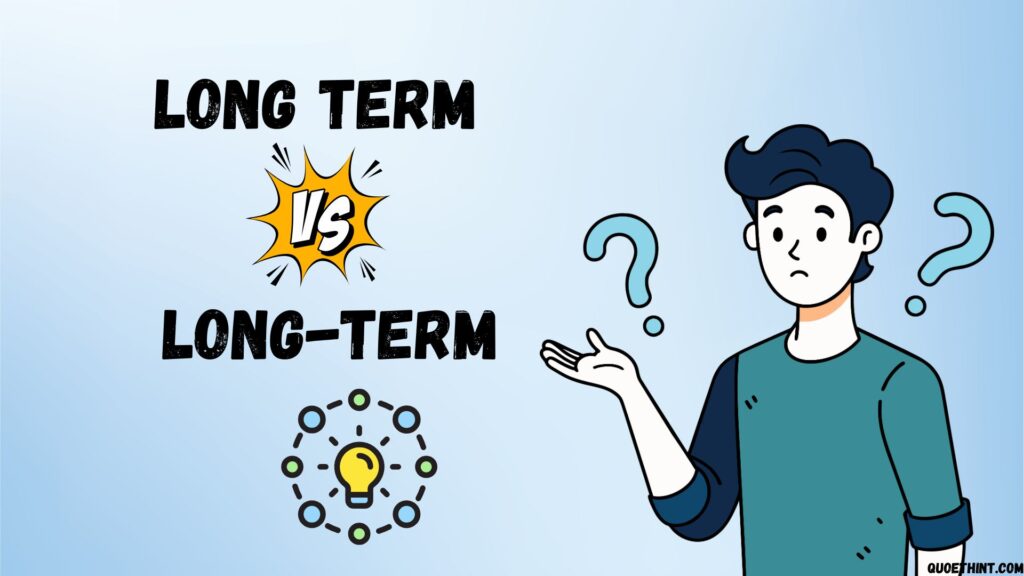Understanding the Basics: Noun vs. Adjective

When it comes to writing correctly, many people stumble over long term versus long-term. The distinction lies in grammar and usage.
- Long term (without a hyphen) functions as a noun phrase. It often refers to a lengthy duration or an extended period.
- Example: “We are planning for the long term.”
Here, long term acts as the object of the sentence, referring to the concept of the future.
- Example: “We are planning for the long term.”
- Long-term (with a hyphen) is a compound adjective. It describes nouns, often indicating prolonged, enduring, or sustained qualities.
- Example: “Sarah proposed a long-term strategy for company growth.”
The hyphen links the words to modify strategy, showing it’s not just any strategy, but one focused on a prolonged timeframe.
- Example: “Sarah proposed a long-term strategy for company growth.”
Think of it this way: if it describes a noun, use long-term; if it stands alone or is the object, use long term.
Common Scenarios: Emails and Workplace Writing
Email Example 1: Using Long-Term as an Adjective
Subject: Proposal for Long-Term Collaboration
Hi James,
After reviewing your project, I believe a long-term partnership would benefit both our teams. By focusing on sustained goals, we can ensure lasting results and strategic growth over the next several years.
Best,
Emma
In this scenario, long-term modifies partnership, making it clear that the collaboration isn’t just temporary. The hyphen signals the compound adjective.
Email Example 2: Using Long Term as a Noun Phrase
Subject: Planning for the Long Term
Hi Michael,
I wanted to share some thoughts on planning for the long term. While short-term results are important, our focus should remain on extended duration outcomes and future-oriented goals.
Regards,
Sophia
Here, long term stands alone as the object of the sentence. No hyphen is needed because it is not directly modifying a noun.
Hyphenation Rules and Why They Matter
Hyphenation may feel minor, but it impacts clarity and precision in professional writing. Incorrect usage, like writing longterm as one word, is widely considered wrong.
- Correct: long-term investment, long-term planning, long-term effects
- Incorrect: longterm investment, longterm planning
A simple hyphen ensures readers instantly understand whether the phrase is an adjective or a noun phrase. In business reports, emails, or strategic documents, this small mark can prevent ambiguity.
Long-Term vs. Long Term in Strategy Documents
When drafting strategic plans, writers often need to balance short-term and long-term objectives.
- Example: “Our company’s long-term vision focuses on sustainability and innovation over the next decade, while short-term initiatives handle immediate challenges.”
Notice how long-term modifies vision, emphasizing prolonged planning, while short-term serves the same grammatical function for immediate goals.
Using long term instead of long-term here could confuse readers or make your writing look less polished.
Everyday Writing: Blogs, Articles, and Emails
Even casual writing benefits from this distinction.
- Blog Example: “Investing in education is a long-term solution to social inequality.”
Long-term clearly modifies solution, highlighting its enduring impact. - Email Example: “I’m thinking about our team’s performance in the long term, not just the next quarter.”
Here, long term functions as a noun phrase the object of focus without needing a hyphen. - Report Example: “The long-term effects of climate change require future-oriented goals and strategic planning.”
The hyphen emphasizes that the effects are enduring, while related LSI keywords like long-term sustainability naturally fit in.
Synonyms and Alternative Phrases
Sometimes, using synonyms can enhance your writing and avoid repetitive phrasing:
| Usage | Synonyms / Related Terms |
|---|---|
| Long term (noun) | extended period, long haul, distant future, prolonged period |
| Long-term (adjective) | prolonged, enduring, lasting, extended, sustained, chronic |
Example sentence: “Our extended period of research will inform a lasting solution for our clients.”
Historical Context and Origins

Interestingly, long term originates from Middle English, combining long + term to describe an extended duration. Its hyphenated cousin long-term gained traction in financial and insurance contexts around 1876, emphasizing future-oriented commitments.
Even today, financial analysts, business strategists, and sustainability experts rely on this distinction for clarity and precision.
Tips for Writers: Avoiding Common Mistakes
- Check the function: Is it modifying a noun? Hyphenate it. Standalone? Leave it open.
- Avoid “longterm”: It’s widely seen as a grammatical error.
- Proofread professional documents: Even small hyphen mistakes can reduce credibility.
- Use examples in context: Emails, blogs, reports, and proposals all benefit from correct usage.
- Balance sentence complexity: Mix short, punchy sentences with longer explanatory ones to maintain burstiness and natural flow.
Quick Reference Guide
| Phrase | Function | Example |
|---|---|---|
| long term | noun phrase | Planning for the long term ensures sustainability. |
| long-term | compound adjective | Our long-term goals include market expansion. |
| longterm | incorrect | Avoid using this form. |
Final Thoughts
Choosing between long term and long-term may seem small, but it impacts writing clarity, professionalism, and reader understanding. By focusing on grammatical function, context, and hyphenation rules, you can write with confidence and precision.
Remember, in emails, strategic reports, blogs, or proposals, a simple hyphen can distinguish a prolonged effort from a duration of time. Using these rules correctly demonstrates attention to detail and strong command of the English language.
Bugti is the founder of Quoethint.com, a hub for English language tips, writing advice, and grammar guidance. With years of experience in English studies and a passion for clear communication, Bugti created this platform to make grammar and writing easy to understand for everyone.
